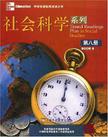中学生拓展课程系列
出版时间:2008-7 出版社:上海外语教育出版社 作者:曹娟,方力 注 页数:101
前言
阅读既是理解和吸收语言文化信息的重要手段之一,又是语言文化信息的最便捷的输入源。我国教育部新制定的全日制义务教育和普通高级中学《英语课程标准》对学生的阅读技能从三级到九级提出了明确的要求。在目前国内外的各种英语测试中,阅读理解所占的比重越来越大。为此,我们特向你推荐“中学英语拓展阅读丛书”(Timed Readings Plus)。本丛书含有以下3个子系列:社会科学(Social.Studies)、自然科学(.Science)及数学(Mathematics),由上海外语教育出版社从美国McGraw Hill Glencoe公司引进出版。社会科学和自然科学各有10个分册,社会科学每册有24课,自然科学每册有25课,每课两篇阅读材料;数学有5个分册,每册有15课,每课两篇阅读材料。本丛书语言地道,知识面广,信息量大,能有效训练学生的阅读理解能力,提高他们的阅读速度。每课的第一篇阅读材料篇幅长400单词左右,侧重训练学生的快速阅读能力;阅读理解题则主要检查学生是否能在快速阅读后掌握阅读材料中的事实和材料所传达的思想。每课中的第二篇阅读材料较短,着重训练学生的阅读技巧,如:从上下文中猜测生词的含义,找出作者的观点,得出中心思想,排列事件顺序,推断作者的论点等。因此,我们认为它是一套训练学生阅读速度及阅读理解能力并能同时开拓他们视野的拓展型丛书,适合外国语学校初二及以上年级学生和非外国语学校高中学生课内、外使用。 怎样使用本系列丛书呢?我们有以下的一些阅读策略供大家参考。 1.阅读时,要集中注意力。 2.用一分钟阅读标题,并思考以下问题:我是否了解这一话题?我从这个话题中能学到什么?这个话题引起了我怎样的思考? 3.重点阅读文章第一句和最后一句,因为第一句和最后一句往往是作者提出自己观点和总结全文观点的关键句子。 4.快速阅读全文以获得材料所传达给你的信息。如遇到含有姓名、日期或数字等的内容,你应该放慢速度,以便记住这些内容。 怎样才是一个快速阅读者?
内容概要
遨游知识天地学习地道英语 你听说过环境建筑学吗?你知道转基因技术基于怎样的原理吗?我们每天点击的互联网是在哪种巧合下诞生的?欧洲中世纪城堡中一天的生活是怎样的?中国古代的造纸术分哪几个步骤?你一定想知道这些问题的答案吧。翻开这套"中学英语拓展阅读丛书",你就走进了一个五彩斑斓的奇妙世界。 《中学英语拓展阅读丛书》由外教社从美国著名出版机构麦格劳一希尔(McGraw Hill)公司引进,语言地道,知识面广,信息量大,是一套既注重培养学生英语阅读能力,又致力开阔他们视野的拓展型丛书。整套书编写理念先进,编排设计科学,难度逐级递升,既适合外国语学校及外语特色学校初二至高三年级的学生使用,也适合普通中学同等水平的学生使用。 我们期盼你在趣味盎然的阅读环境中培养阅读能力,邀游知识天地,学习地道英语。
书籍目录
致学生致老师1 A When the Stars Shone in Harlem1 B Langston Hughes, Harlem's Poet Laureate2 A The Fishing Industry of Nova Scotia2 B Tidal Action in the Bay of Fundy3 A Connecting Two Oceans3 B Fighting Yellow Fever in Panama4 A Powerful First Ladies4 B Jacqueline Kennedy Onassis5 A The Invention of the Wheel5 B Sumerian Chariots: The First Vehicles of War6 A Women's Role in Nazi Germany6 B Dr. Gerda Lerner: Putting Women into History7 A Cambodia's Khmer Civilization: The Angkor Period7 B Touring Ancient Khmer Ruins8 A Living Longer8 B The Growth of Gray Power9 A The Stock Market: Its Bulls and Bears9 B Trading on the NASDAQ10 A The Coldest Continent10 B A Bird Lover's View of Antarctica11 A Social Class in the Roman Empire11 B Helena: From Tavern Girl to Empress to Saint12 AMaroon Cultures12 B Tales of Ti Malice13 AFootwear, Past and Present13 B The Lasting Impact of Jan Ernst Matzeliger14 ANativism and the Know-Nothing Party14 B Sacco and Vanzetti: Guilty?15 ADescendents of the Inca15 B Musical Instruments of the Andes16 APreschool: What Should It Do?16 B Head Start: An Even Start in School?17 A The French Revolution and A Tale of Two Cities17 B Marie Antoinette: Last Queen of France18 A The Great Chicago Fire18 B Rebuilding Chicago19 ASolving the Puzzle of Polynesia19 B Kon-Tiki: Following in the Wake of Ancient Navigators 20 A Alexis de Tocqueville's View of Democracy in America20 B Tocqueville's View of Prisons21 A The Right Attorney for the Right Job21 B Jumping the Bar: Arabella Mansfield22 A Roger Williams: A Man of Conscience22 B Puritanism in New England23 AMongolia23 B Kublai Khan, Ruler of an Empire24 A What Is the United States Supreme Court?24 B Oliver Wendell Holmes Jr. : Supreme Court Justice附录 Answer Key Reading Rate Comprehension Score Comprehension Skills Profile
章节摘录
Social Class in the Roman Empire The Roman Empire lasted almost 500 years. At its peak, near the end of the third century A.D., it had absorbed parts of northern Africa and the Near East, along the Mediterranean Sea, and almost all of Europe. Roman governors enforced Romes class system and laws. Status was based on ancestry, property and wealth, dtizenship, and freedom. There were two classes, each with its own divi- sions, and mobility through the ranks foUowed a rigid set of rules. At the top were aristocrats, who were people of privilege; and below them were the plebeians. Women in all classes were considered socially and biologically inferior to men. Women could not vote, hold public office, or choose a mate, but they could own and inherit property. The aristocrats included the patricians who were rich landowners. Senators, an elite group of 600 men from this dass, also held the highest offices and judgeships in the empire. Senators could expect to move up through several ranks, of which consul was the highest. Below patri- cians were equestrians. These were businessmen working in financial realms-such as banking and tax collection, commerce, and public building projects. Plebeians were citizens employed as teachers, doctors, actors, musicians, craftsmen, and manual laborers. Some were peasants, subsisting on what they could force from the soil. Many were unemployed. They were powerless in general, but most emperors made a point of control- ling food prices and offering free entertainment to keep them happy-or at least quiet. At the bottom of the social ladder were freedmen, slaves, and various noncitzens. Slaves were crucial to the empires economy and at one point made up about 40 percent of the popula- tion. Although many of them were treated harshly, even cruelly, others were valued for their skills and knowledge. Slaves were not necessarily doomed to a lifetime of slavery. They could buy their own freedom or be freed by their owners in a process called "manumission. " Formal manumission as handled by a magistrate gave the freed slave full Roman citizenship. Money and achievement, however, began to rival ancestry as a way to move up in life. The culture and wealth of the provinces made themselves felt in the capital city of Rome. Gitizen- ship was extended to conquered peoples-and later, provincials were admitted to the Senate.
图书封面
评论、评分、阅读与下载
用户评论 (总计0条)
推荐图书
- 一千零一夜
- 动物产品安全生产与卫生学
- 小学生课外阅读必读丛书1
- 学习与评价课课练
- 现代企业经营管理
- 电子商务基础
- 物流管理基础与实务
- 畜产品质量安全与生产技术
- 有机化学学习指导
- 药用植物病虫害防治
- 美人茶饮
- 美人食材
- 北大绿卡·新课标教材课时同步讲练
- 北大绿卡新课标教材课时同步讲练:高中地理(必修2)(湖南教育版)
- 北大绿卡新课标教材课时同步讲练:高中地理(必修3)(湖南教育版)
- 北大绿卡新课标教材课时同步讲练:高中语文(必修5)(江苏教育版)
- 北大绿卡:高中思想政治(必修4)(人教版新课标教材课时同步讲练) (平装)
- 植物雄性不育机理研究
- 平安农机知识手册 (平装)
- 犬猫眼科学彩色图谱
- 金银岛
- 雾都孤儿
- 全国农作物审定品种2004(上下)
- 绿野仙踪
- 全国农作物审定品种2003(上下)
